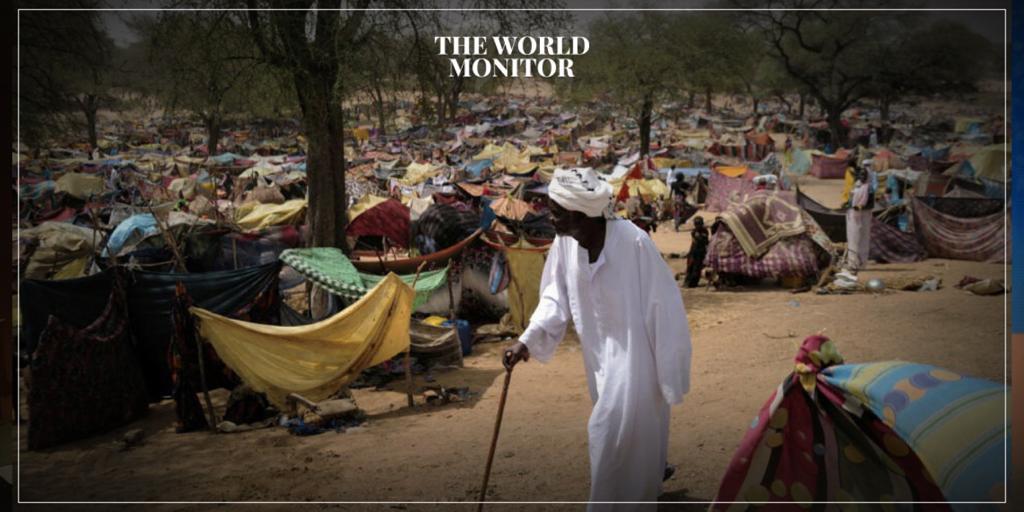As the conflict in Sudan reaches its half-year milestone, the nation grapples with a harrowing scenario of death, displacement, and economic devastation. Recent reports indicate that approximately 10,000 lives have been lost, nearly 6 million individuals have been displaced, and the financial toll has soared above an astonishing 60 billion dollars, painting a stark picture of a country deeply mired in turmoil and suffering.
The ongoing war between the Sudanese Army and the Rapid Support Forces (RSF) has cast a dark shadow across not only the capital, Khartoum, but has also painfully marked various other regions of the country. The bloody conflict has expanded alarmingly in recent weeks, with RSF forces making significant inroads into the central state of Al Jazirah, following their control of the strategic region of “Al Aylafun,” located approximately 30 kilometers east of Khartoum, and once considered one of the capital’s key remaining gateways.
Violent clashes have also persisted in Al Obied, the capital of North Kordofan, and various regions of the Darfur province in the country’s west, escalating the suffering and challenging any visions of peace and stability in the foreseeable future.
Moreover, aerial and ground bombardments have pummeled several residential districts in the triad of the capital cities — Khartoum, Omdurman, and Khartoum North — as well as in Al Obied and Nyala, resulting in hundreds of casualties over the past three days, according to statements from the Sudan Doctors Syndicate and the Emergency Lawyers Association.
Notably, the incessant fighting, which has been raging since mid-April, has wrought colossal damage on the health sector amidst the rampant spread of epidemics like malaria and dengue fever. Approximately 70% of hospitals have been rendered utterly non-functional, while those still operational grapple with severe shortages of medicines, medical supplies, services, and ambulances.
Emergency medical teams, working under perilously insecure conditions, have been forced to transport the injured from remote areas using rudimentary hand carts. Hospitals are also severely hampered by a critical shortage of virus testing kits, leading to a cessation of blood donation in some instances.
In this critical juncture of Sudan’s history, the international community gazes into the abyss of a humanitarian crisis, reflecting upon the tangible impacts and the lamentable strife that the citizens have been plunged into. The socio-economic and political repercussions of this ongoing battle threaten to cascade into broader regional implications, echoing long into the future of Sudan and its people.
“Economic Contraction in Sudan: A Comprehensive Overview”
In a challenging economic climate, Sudan faces a steep economic contraction, predicted to be 12% in 2023 by the World Bank. This comes as a repercussion of the extensive implications spawned by a war that halted production wheels, especially in the economic hub of the nation, Khartoum, in addition to significantly affecting regions in both Darfur and Kordofan.
Over 400 establishments operating in various fields such as food and pharmaceutical industries in Khartoum have been entirely out of service, due to massive destruction accompanied by the chaos ensuing from the combat. Simultaneously, productive and agricultural projects across the country have suffered due to lack of funding and administrative instability.
Former Finance Minister, Ibrahim Al-Badawi, estimated the damages to the country’s infrastructure to be around 60 billion dollars, with expectations of significant rise in losses amid ongoing warfare. In an interview with Reuters last month, Al-Badawi anticipated that the GDP would decline by approximately 20% if the war does not halt promptly.
Amidst the extensive chaos accompanying the battles, about 100 branches of banks operating in the country, including major parts of the Central Bank of Sudan, were exposed to looting, burning, and total destruction. Reports indicate that it is currently suffering from a significant cash shortage, amidst rumors of plans to print currency abroad, which is extremely costly.
Prices of some major food commodities have more than tripled due to the halt in supply chains and the depreciation of the Sudanese pound, with one dollar currently trading at 840 pounds. According to investors in the industrial sector, the industrial infrastructure in Khartoum, which constitutes about 70% of the country’s industrial sector, has been fully destroyed and sabotaged. Concurrent with the combat operations, hundreds of thieves and looters spread across the industrial areas in the three capital cities, plundering everything, including machinery, parts, raw materials, production inventory, and even building roofs, air conditioning, and lighting in a scene unseen in Khartoum throughout its history spanning over 200 years.
Massive Losses Amidst Conflict: A Deep Dive into the Catastrophe
* Extensive Utility Shortages: Over 80% of the capital’s regions are experiencing severe shortages in electricity and water supplies after combat has demolished many facilities and main networks. Several capital areas continue to dwell in utter darkness and a complete halt of water supplies since the first week of fighting.
* Healthcare Crisis: Hundreds have died from chronic diseases such as kidney diseases and diabetes due to a sharp decline in medical care and life-saving medications. With increasing numbers of corpses left on the streets and those buried within neighborhoods and household courtyards, experts warn of a massive health and environmental disaster. The Sudan Doctors’ Syndicate anticipates a significant rise in death toll due to diseases sprouting from the health and environmental impacts of the war.
* Escalating Economic Decline: As the fighting persists, the horrifying economic deterioration escalates, especially amidst the vast destruction to the infrastructure, economy, residential neighborhoods, and the significant damages to the banking sector.
* Ghost Towns and Human Tragedies: Most of these neighborhoods have turned into ghost towns after about 95% of their inhabitants fled. However, the remainder who stayed in their homes have faced unprecedented humanitarian tragedies. Some have died with no one to bury them, while others remained under rubble for days until the odor of their corpses permeated the air.
* Extensive Destruction from Airstrikes and Artillery: Intensive aerial and artillery bombardments have caused widespread destruction, affecting 60% of the vital areas in the capital, including the presidential palace, parts of the army general command, several museums, historical buildings, ministries, government, and private bodies, some of which have been entirely burnt.
* Educational Halt: About 15 million students from various educational stages, including around one million students from 155 universities and specialized colleges (60% of which are in the capital), have stopped studying. Over 70% of schools, universities, institutes, and specialized postgraduate governmental and private colleges in Khartoum have been subject to total or partial vandalism.






